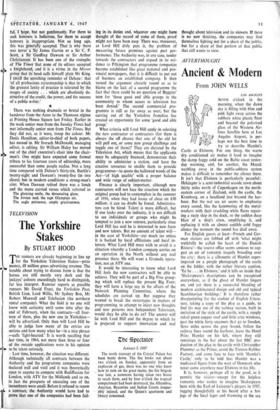The Yorkshire Stakes
TELEVISION
By STUART HOOD
P runners are already beginning to line up for the Yorkshire Television Stakes—prize money, £8 million gross advertising revenue. The trouble about trying to discuss form is that the horses are still mostly very dark and the jockeys' colours exceedingly hard to distinguish, far less interpret Rumour reports as possible runners Mr David Frost, the Yorkshire Post, British Lion, Lord Willis, Mr Sydney Box, Mr Robert Maxwell and Telefusion (the northern rental company). What the field is no one will know with certainty until some time after the end of February, when the contracts—all four- teen of them, plus the new one in Yorkshire- . will be advertised. Only then will Lord Hill be able to judge how many of the entries are serious and how many what he—in a nice phrase .1-calls 'light-hearted.' It is worth recalling that 'last time, in 1964, not more than three or four • taf the outside applications were in his opinion to be taken seriously.
Last time, however, the situation was different. Although technically all contracts between the Authority and the programme companies were declared null and void and it was theoretically open to anyone to compete with Rediffusion for London, with ATV for the Midlands and so on, in fact the prospects of unseating one of the incumbents were small. Before it refused to renew a contract, the Authority would have had to prove that one of the companies had been fail- ing in-its duties and, whatever one might have thought of the record of some of them, proof might not have been easy. There was, moreover, as Lord Hill drily puts it, the problem of measuring future promises against past per- formance. The Authority was, in any case, tender towards the contractors and argued in its evi- dence to Pilkington that programme companies become established like great national and pro- vincial newspapers, that it is difficult to put out of business an established company. It then turned the argument cleverly round so as to blame on the lack of a second programme the fact that there could be no question of Buggins' turn for 'those good and able groups in the community to whom access to television has been denied.' The second commercial pro- gramme is still as far away as ever; but the carving out of the Yorkshire franchise has created an opportunity for some 'good and able group.'
What criteria will Lord Hill apply in selecting the new contractor or contractors (for there is always the off chance that one of the old lot will pull out, or some new group challenge and topple one of them)? They are dictated by the Television Act, which means that the applicants must be adequately financed, demonstrate their ability to administer a station, and have the creative resources to enable them to provide programmes—to quote the hallowed words of the Act—'of high quality' with a proper balance and wide range of subject-matter.
Finance is clearly important, although new contractors will not face the situation which the original group had to contemplate in the summer of 1956, when they had losses of close on £10 million; it can no doubt be found. Administra- tors can be hired. Talent is more difficult, but if one looks over the industry, it is not difficult to see individuals or groups who might be tempted to join a new venture, particularly since Lord Hill has said he is interested in new faces and new talents. But no amount of talent will— in the case of Yorkshire—cut much ice unless it is backed by local affiliations and local in- terests. What Lord Hill must wish to avoid is a situation whereby a London company carries on an operation in the North without any real presence there. He will want a Granada opera- tion, not an ATV one.
It would be interesting to know what Lord Hill feels the new contractors will be able to achieve. They will be part of a Big Five group- ing which will replace the present Big Four; they will have a large say in the affairs of the Network Planning Committee, where the schedules are carved up. But suppose they wanted to break the stereotypes in matters of programming, to attempt to inject new thoughts and new patterns into Independent Television, would they be able to do so? The answer will lie with Lord Hill and the degree to which he is prepared to support innovation and real thought about television and its viewers. If there is no new thinking, the companies may find themselves fighting not for a share of the public, but for a share of that portion of that public that still wants to view.






























 Previous page
Previous page